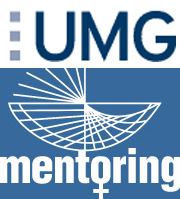Margaret Maltby Mentoring Program for female scientists (deadline: 15 Oct 2022)
 Every two years the University Medical Centre (UMG) is inviting applications for the Margaret Maltby Mentoring Program. This program is offering young female scientists the opportunity to manage their careers successfully with mentoring; a combination of personal accompaniment by a female or male mentor, training and qualification as a person of leadership, coaching in small groups, and networking.
Every two years the University Medical Centre (UMG) is inviting applications for the Margaret Maltby Mentoring Program. This program is offering young female scientists the opportunity to manage their careers successfully with mentoring; a combination of personal accompaniment by a female or male mentor, training and qualification as a person of leadership, coaching in small groups, and networking.
Apply by setting up an appointment for a preliminary talk with the program coordinators Ulla Heilmeier and Frauke Ritter until the October 15, 2022.
The program is aimed at young female scientists wishing to embark on a scientific or science-related career in the fields of medicine, the natural sciences, psychology, or from faculties/institutes of an interdisciplinary nature. We are specifically looking for postdocs and doctorate students, doctors in training, group leaders, and habilitands of the University Medical Centre Göttingen, as well as from institutions of the University or closely linked with the University over the entire Göttingen Campus.
About the Mentoring Program
The programm commences in April every two years and runs for 24 months. Up to 20 mentees are selected per class. The core of systematic mentoring comprises the accompaniment of a young female scientist – the mentee – along a section of her career path by an experienced person of leadership – the mentor. Embedded in a framework comprising an opening and closing ceremony, an introduction, and an interim meeting, the concept is based on four pillars: Mentoring Tandem, Coaching in small groups, Training and Networking.
Who was Margaret Matlby?
In 1895, Margaret Maltby became the first woman to attain a doctorate at the University of Göttingen after submitting an experimental thesis in the field of physical chemistry on the subject of “A Method to Determine Levels of High Electrolytic Resistance” under the supervision of the later Nobel Prize winner Walther Nernst. She later worked at the Barnard College in New York, where she spent 31 years as a professor, at one point becoming the Chair of Physics. Throughout her life, she actively campaigned for the equality of women particularly in the natural sciences, as well as for the compatibility of family life and study or career.
Further information on the program can be found on this Flyer.
